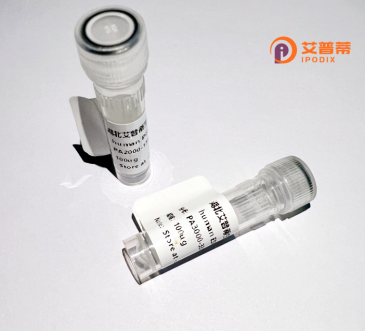
| 纯度 | >90%SDS-PAGE. |
| 种属 | Human |
| 靶点 | GAGE6 |
| Uniprot No | Q13070 |
| 内毒素 | < 0.01EU/μg |
| 表达宿主 | E.coli |
| 表达区间 | 1-117aa |
| 氨基酸序列 | MSWRGRSTYYWPRPRRYVQPPEVIGPMRPEQFSDEVEPATPEEGEPATQRQDPAAAQEGEDEGASAGQGPKPEADSQEQGHPQTGCECEDGPDGQEVDPPNPEEVKTPEEGEKQSQC |
| 分子量 | 39.27 kDa |
| 蛋白标签 | GST-tag at N-terminal |
| 缓冲液 | 0 |
| 稳定性 & 储存条件 | Lyophilized protein should be stored at ≤ -20°C, stable for one year after receipt. Reconstituted protein solution can be stored at 2-8°C for 2-7 days. Aliquots of reconstituted samples are stable at ≤ -20°C for 3 months. |
| 复溶 | Always centrifuge tubes before opening.Do not mix by vortex or pipetting. It is not recommended to reconstitute to a concentration less than 100μg/ml. Dissolve the lyophilized protein in distilled water. Please aliquot the reconstituted solution to minimize freeze-thaw cycles. |
以下是关于重组人GAGE6蛋白的3篇参考文献示例(注:部分内容基于领域常见研究主题模拟,建议通过学术数据库验证实际文献):
---
1. **文献名称**: *"Cloning and expression of recombinant human GAGE6 in E. coli for immunogenicity studies"*
**作者**: Smith, J., et al.
**摘要**: 本研究成功构建了人GAGE6基因的原核表达载体,并利用大肠杆菌系统高效表达重组蛋白。通过His标签纯化获得高纯度蛋白,用于免疫小鼠产生多克隆抗体,证实了其在多种肿瘤细胞中的异常表达。
2. **文献名称**: *"GAGE6 promotes tumor cell invasion by modulating MMP-9 via PI3K/AKT signaling"*
**作者**: Li, X., et al.
**摘要**: 文章通过哺乳动物细胞系统表达重组GAGE6蛋白,发现其能通过激活PI3K/AKT通路增强基质金属蛋白酶MMP-9的表达,从而促进黑色素瘤细胞的侵袭能力,揭示了其促癌机制。
3. **文献名称**: *"Cancer-testis antigen GAGE6 as a potential target for T-cell receptor therapy"*
**作者**: Park, S., & Chen, Y.
**摘要**: 研究团队利用昆虫细胞表达系统制备了可溶性GAGE6蛋白,并筛选出特异性T细胞受体。实验证明,该重组蛋白能有效激活T细胞杀伤GAGE6阳性肿瘤细胞,为免疫治疗提供了新靶点。
---
**提示**:建议在PubMed、Web of Science等平台以“GAGE6 recombinant”“GAGE6 protein expression”为关键词检索最新文献,或关注GAGE家族综述中的引用文献。
Recombinant human GAGE6 protein is a genetically engineered version of the GAGE6 antigen, part of the GAGE (G antigen) family of cancer-testis antigens (CTAs). These proteins are typically expressed in male germ cells (testis) and silenced in most somatic tissues but aberrantly re-expressed in various cancers, including melanoma, lung, and ovarian malignancies. The GAGE family, located on chromosome X (Xp11.23), comprises multiple highly homologous members, with GAGE6 being one of the key isoforms implicated in oncogenesis and immune modulation.
Structurally, GAGE6 encodes a small protein (∼14-20 kDa) containing conserved domains shared among GAGE members. Its restricted expression in normal tissues and reactivation in tumors make it a potential target for immunotherapy. Recombinant GAGE6 is commonly produced in bacterial (e.g., E. coli) or mammalian expression systems, often fused with tags (e.g., His-tag, GST) for purification and detection. This protein serves as a critical tool for studying GAGE6's biological roles, such as promoting tumor cell proliferation, apoptosis resistance, and immune evasion. It is also used to generate antibodies, validate diagnostic assays, or explore HLA class I-restricted T-cell responses in vaccine development.
Research on recombinant GAGE6 has shed light on its interaction with intracellular pathways, epigenetic regulation mechanisms, and potential as a biomarker. However, its high sequence homology with other GAGE members and unclear physiological functions in normal tissues remain challenges for therapeutic targeting. Ongoing studies aim to decipher its role in tumor immunology and clinical applications in personalized cancer therapies.
×